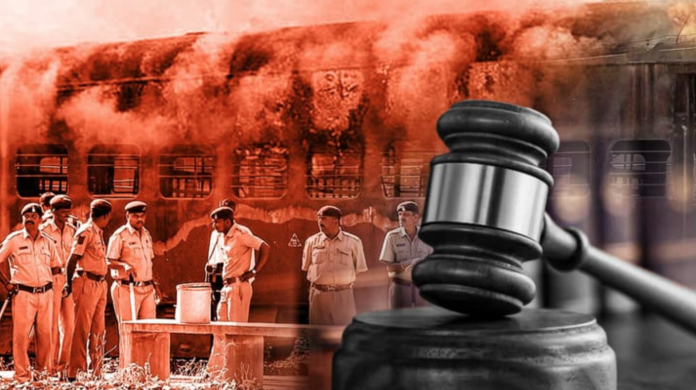The acquittal comes at a time when a controversy is going on in India over the BBC documentary India: The Modi Question, which questioned Prime Minister Narendra Modi’s alleged inaction during the 2002 Gujarat riots while he was the state’s chief minister.
TCN Correspondent
NEW DELHI — Invoking the principle of “corpus delicti”, a sessions court at Halol in Gujarat’s Panchmahal district on 24 January (Tuesday) acquitted 19 persons accused of killing 17 Muslims — including two children — in the post-Godhra riots in the state in 2002.
The incident occurred on 28 February 2002 at Delol village in the district’s Kalol Taluka. The bodies alleged to have been of the victims were burned to the extent that no DNA profiling of the charred bone pieces could be done.
This led Additional Sessions Judge Harsh Trivedi to acquit the accused — concluding that the prosecution failed to prove the case at hand.
Applying the concept of “corpus delicti”, the court observed in the judgment, “There should be a body or at least a body of evidence for police to work with before charging someone with the murder case. When someone goes missing and police don’t have a body or at least a body of evidence, how can the police further proceed or work with which that does not exist.”
“Corpus delicti” is a Latin phrase that translates to “body of the crime.” It generally refers to the principle that no one should be convicted of a crime without sufficient evidence that a crime must be proved to have occurred.
Judge Trivedi said there is a general rule not to convict anybody unless “corpus delicti” can be established — that is until the dead body has been found.
“When the forensic reports in the instant case indicated that no DNA profiling results would be obtained from the completely charred bone pieces, then automatically rule of Corpus Delicti was required to be considered,” he noted.
The court further concluded that the prosecution could not prove the suspected place of crime — with bodily remains not being recovered from the suspected place of the offence.
The court also noted that the prosecution failed to establish beyond doubt the presence of the accused at the site of the offence or their specific role in the crime. That it failed to recover the alleged weapons used to carry out the crime from the accused and that there was no inflammable substance found at the suspected site of crime.
The accused were arrested for allegedly killing 17 persons, the bodies of whom were allegedly burnt to destroy the evidence.
The communal pogrom in the state along the western coast of India had erupted following four coaches of the Sabarmati Express was torched by a mob near Godhra town in Panchmahal on 27 February 2002 — killing 59 passengers. Most of the victims in the train were karsevaks (volunteers) who were returning from Ayodhya.
Based on a complaint wherein several Muslims at the Kalol relief camp who had fled from the Delol village alleged their family members are missing, a First Information Report (FIR) was lodged
A resident of another relief camp also lodged a complaint, stating that he had fled his house in the village with his son to save themselves from a mob of 150-200 people and that there were 18 Muslims from the village who were missing.
An investigation into the first FIR led to the recovery of charred bones. During the probe, the investigators also found out other residents, who too had lost their family members. Claiming that they had seen the accused murdering their family members with weapons like axe and swords, the witnesses identified 20 people as accused — alleging that the latter were part of the murderous mob.
However, the investigating authorities could not recover the arms used in the crime.
Subsequently, another FIR for the same incident was registered in 2004 (two years after the incident) — naming the 19 accused who were taken into custody. A chargesheet in the case was filed in 2004 and charges were framed — leading to the beginning of the trial.
Five of the accused died during the trial that went on for around 18 years to result in the acquittal of the rest 14 accused — Sureshbhai Patel, Kiritbhai Joshi, Akshay Kumar Shah, Jinabhai Rathod, Narendra Kumar Kachhiya, Alkesh Kumar Vyas, Nasibdar Rathod, Dilip Kumar Bhatt, Dilip Sinh Gohil, Yogesh Kumar Patel, Nirav Kumar Patel, Ashokbhai Patel, Killol Jani and Mukesh Bharvad.
On 15 August last year, 11 rapists of Bilkis Bano, who was gang-raped and seven members of her family were killed while they were fleeing their village during the 2002 riots, were released under the Gujarat government’s remission policy — citing their “good behaviour”. They were sentenced to life imprisonment.
In June 2022, the Supreme Court dismissed a petition filed by Zakia Jafri — the widow of Ex-Congress MP Ehsan Jafri who was killed in the violence after his Gulberg Society came under attack. She had challenged the closure report filed by the special investigation team (SIT). The top court discarded the allegations of a larger conspiracy by high state functionaries, including the then Gujarat Chief Minister Narendra Modi who is now prime minister, and 63 others.


